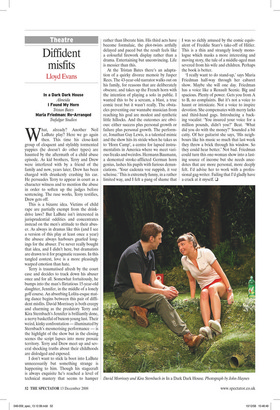Diffident misfits
Lloyd Evans
In a Dark Dark House Almeida I Found My Horn Tristan Bates Maria Friedman: Re-Arranged Trafalgar Studios
What, already? Another Neil LaBute play? Here we go again then. This time his close-knit group of eloquent and stylishly tormented yuppies (he doesn’t do other types) are haunted by the aftermath of a child abuse episode. As kid brothers, Terry and Drew were interfered with by a friend of the family and now, years later, Drew has been charged with drunkenly crashing his car. He persuades Terry to appear in court as a character witness and to mention the abuse in order to soften up the judges before sentencing. The ruse works, Terry testifies, Drew gets off.
This is a bizarre idea. Victims of child rape are partially exempt from the drinkdrive laws? But LaBute isn’t interested in jurisprudential oddities and concentrates instead on the men’s attitude to their abuser. As always in dramas like this (and I see a version of this play at least once a year) the abusee always harbours gnarled longings for the abuser. I’ve never really bought that idea, and I didn’t here, but dramatists are drawn to it for pragmatic reasons. In this tangled context, love is a more pleasingly warped emotion than hate.
Terry is traumatised afresh by the court case and decides to track down his abuser once and for all. Somewhat fortuitously, he bumps into the man’s flirtatious 15-year-old daughter, Jennifer, in the middle of a lonely golf course. An absorbing Lolita-esque mating dance begins between this pair of diffident misfits. David Morrissey is both creepy and charming as the predatory Terry and Kira Sternbach’s Jennifer is brilliantly done, a nervy basketful of buxom young lust. Their weird, kinky confrontation — illuminated by Sternbach’s mesmerising performance — is the highlight of the show but in the closing scenes the script lapses into more prosaic territory. Terry and Drew meet up and several shocking truths about their childhoods are dislodged and exposed.
I don’t want to stick la boot into LaBute unnecessarily but something strange is happening to him. Though his stagecraft is always exquisite he’s reached a level of technical mastery that seems to hamper rather than liberate him. His third acts have become formulaic, the plot-twists artfully delayed and paced but the result feels like a colourful firework display rather than a drama. Entertaining but unconvincing. Life is messier than this.
At the Tristan Bates there’s an adaptation of a quirky divorce memoir by Jasper Rees. The 43-year-old narrator walks out on his family, for reasons that are deliberately obscure, and takes up the French horn with the intention of playing a solo in public. I wanted this to be a scream, a blast, a true comic treat but it wasn’t really. The obstacles preventing our wannabe musician from reaching his goal are modest and synthetic little hillocks. And the outcomes are obvious: either success plus personal growth or failure plus personal growth. The performer, Jonathan Guy Lewis, is a talented mimic and the show hits its stride when he takes us to ‘Horn Camp’, a centre for lapsed instrumentalists in America where we meet various freaks and weirdos. Hermann Baumann, a demented stroke-afflicted German horn genius, lashes his pupils with furious denunciations. ‘Your cadenza voz ruppish, it voz scheisse.’ This is extremely funny, in a rather limited way, and I felt a pang of shame that I was so richly amused by the comic equivalent of Freddie Starr’s take-off of Hitler. This is a thin and strangely lonely monologue which masks a more interesting and moving story, the tale of a middle-aged man severed from his wife and children. Perhaps the book is better.
‘I really want to do stand-up,’ says Maria Friedman half-way through her cabaret show. Maybe she will one day. Friedman has a voice like a Renault Scenic. Big and spacious. Plenty of power. Gets you from A to B, no complaints. But it’s not a voice to haunt or intoxicate. Not a voice to inspire devotion. She compensates with merry larks and third-hand gags. Introducing a backing vocalist: ‘You insured your voice for a million pounds, didn’t you?’ Beat. ‘What did you do with the money?’ Sounded a bit catty. Of her guitarist she says, ‘His neighbours like his music so much that last week they threw a brick through his window. So they could hear better.’ Not bad. Friedman could turn this one-woman show into a lasting source of income but she needs anecdotes that are more personal, more deeply felt. I’d advise her to work with a professional gag-writer. Failing that I’d gladly have a crack at it myself. ❑










































































 Previous page
Previous page